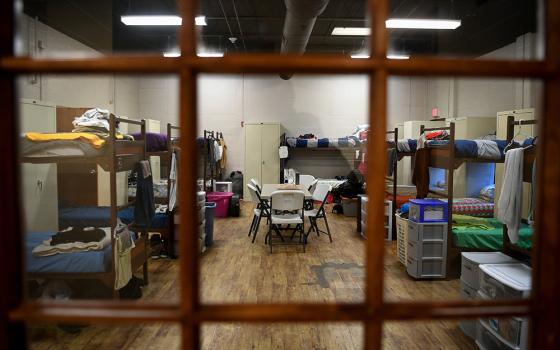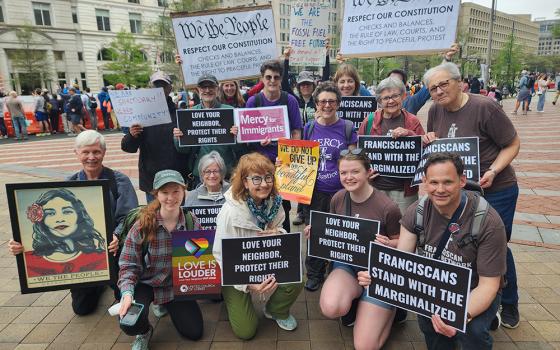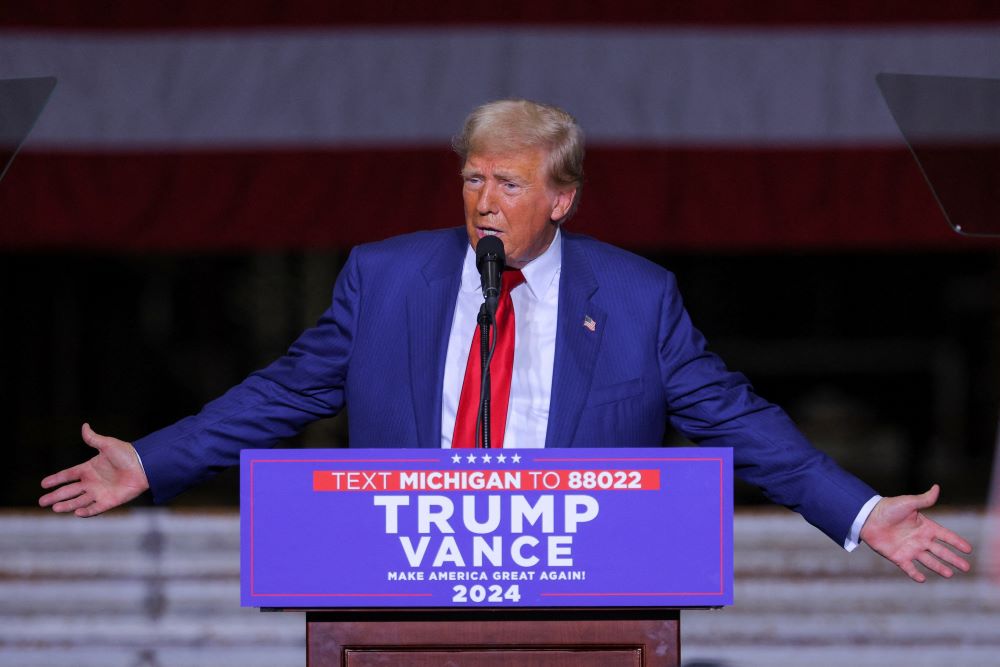
Republican presidential nominee Donald Trump speaks at Alro Steel manufacturing plant in Potterville, Mich., Aug. 29. In comments to multiple media outlets the same day, Trump pledged his administration would require the government or insurance companies to pay for IVF treatments. (OSV News/Reuters/Brian Snyder)
Conservatives have hailed him as "the most pro-life president" in history, but Donald Trump has recently appeared to moderate his position on abortion even while he takes credit for overturning Roe v. Wade.
Trump, Republican presidential candidate, said in an Aug. 29 interview that he'd vote to repeal Florida's six-week abortion ban. A few days earlier, he said that his administration would be "great for reproductive rights." Trump, political analysts told National Catholic Reporter, is trying to appeal to moderate and independent voters who could decide what is expected to be a close election.
"I think what's going on is Trump is running up against the realities of public opinion in a post-Dobbs world," said Geoffrey Layman, the chairman of the political science department at the University Notre Dame, referring to the 2022 U.S. Supreme Court ruling that overturned the high court's 1973 decision in Roe v. Wade that had guaranteed a constitutional right to abortion.
But in trying to win over centrist voters, the former president's pivot has angered antiabortion activists such that some have warned Trump that he could lose their support — and ultimately his bid for the White House — if he softens or abandons his opposition to abortion.
'Trump has this tightrope to walk. … I think it's a tough needle to thread.'
—Geoffrey Layman
"Given the current situation, we have two pro-abortion tickets. A Trump win is not a pro-life win right now," Lila Rose, the president of Live Action, an influential antiabortion organization, said Aug. 29 on the social media platform X. In a follow-up interview with Politico, Rose said she would likely not be voting for Trump.
Rose's position, thus far, appears to be in the minority among antiabortion leaders as many, even while questioning Trump's commitment to their cause, have taken to social media and elsewhere to warn that Vice President Kamala Harris, the Democratic presidential nominee, would still be worse for their movement.

Kristen Day is president of Democrats for Life of America. (Courtesy of Democrats for Life of America)
"When you look at the two candidates, regardless of what Trump says and his flip-flopping on this issue, it's pretty clear from a pro-life perspective that we're much better under Trump than what we would be under Harris," Kristen Day, the president of Democrats for Life of America, told NCR.
Frank Pavone, the national director of Priests for Life who is an ardent supporter of the former president, illustrates how pockets of Trump's pro-life base are still firmly in his corner. Pavone told NCR that Trump's language "could be stronger" on the issue, but that ultimately he does not see Trump "repenting" of his past support for antiabortion policies.
"I don't need President Trump giving pro-life speeches. The leaders of the pro-life movement can take care of that," Pavone said.
To return to the White House, political analysts said, Trump has to maintain a level of approval among his pro-life base that will keep those voters energized and motivated to turn out on Election Day. But he also needs the support of centrist voters who oppose the kind of hardline restrictions and abortion bans that the pro-life base wants.
"Trump has this tightrope to walk," said Layman, who added that in order to keep his pro-life base satisfied, Trump needs to at least "keep the door open" on the possibility of future abortion restrictions while not alienating moderate voters.
"I think it's a tough needle to thread," Layman said.
There is a crucial conversation happening right now about protecting children and political strategy.
We are pro-life activists. What should our response be when Trump repeatedly takes step-after-step back from what it means to protect innocent preborn lives, to the point of…— Lila Rose (@LilaGraceRose) August 29, 2024
John White, a political science professor at the Catholic University of America, told NCR that he believes Trump has "boxed himself in nine ways to Sunday."
"Trump isn't stupid," White said. "He recognizes the political liability of this issue, so he's trying to have it both ways and every way. He's trying to keep a coalition together on this issue and, not surprisingly, he's having a boatload of trouble trying to do that."
Public opinion polls point to Trump's predicament. A Wall Street Journal poll in April found abortion to be the most important issue for suburban women in swing states. A New York Times/Siena College poll in August similarly found a growing share of voters in swing states identified abortion as central to their decision-making in November.
"In this election, I think abortion matters more because of the changes caused by Dobbs and all the ramifications of that," said Ryan Burge, a Baptist pastor and political science professor at Eastern Illinois University who studies trends in American religion.
In an interview with NCR, Burge cited a recent Real Clear Politics/EWTN poll that not only found that Harris leads Trump among Catholic voters, but that abortion is the third most important issue to Catholic voters, after the economy and immigration.
"If abortion is going to matter, it's going to matter among women, especially college-educated women and younger women," Burge said. Polling has consistently shown that the share of Americans who want to make abortion illegal is "very small," he said.
"And the share of Americans who are pro-choice now is larger than what it's ever been," Burge said. "It's an issue where the public has reacted to Dobbs in a pretty demonstrative way."
Cognizant of the polling that shows a majority of Americans want abortion to be kept legal, especially in the first weeks of pregnancy, Trump has been trying to thread the abortion needle for months on the campaign trail.
On Aug. 23, Trump posted on his social media platform that his administration "would be great for women and their reproductive rights." In using the phrase "reproductive rights," Trump borrowed language, often used by liberal activists and Democratic politicians, that is understood to refer to abortion.
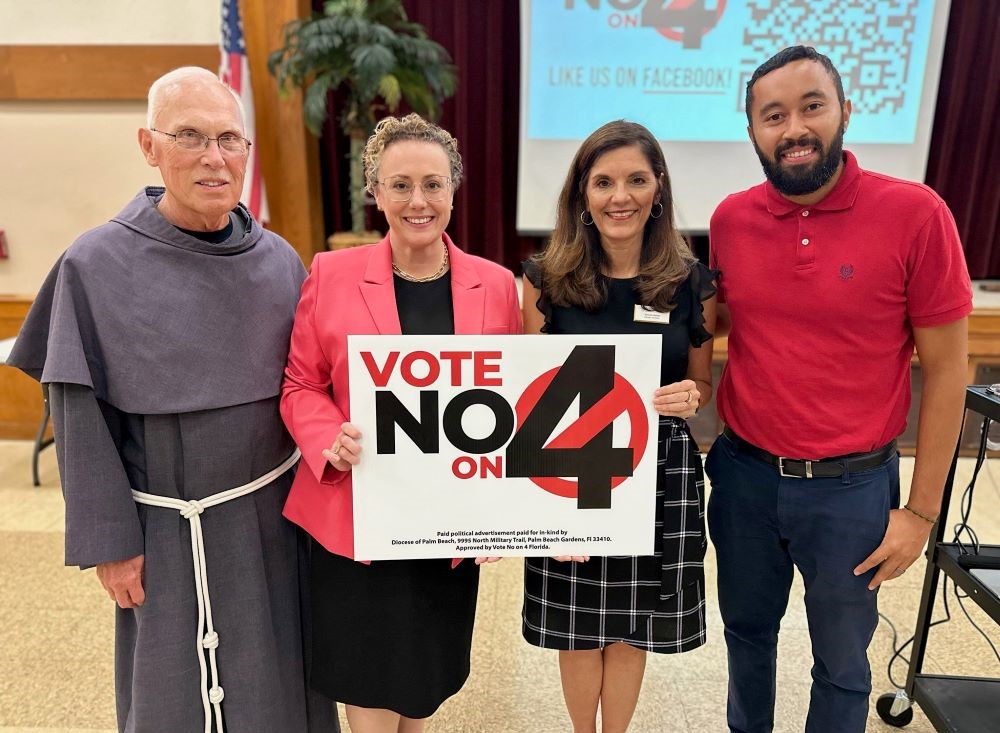
Franciscan Fr. Mark Szanyi, pastor at St. Lucie Parish in Port St. Lucie, Fla., left, stands with Republican state Sen. Erin Grall, Deanna Herbst-Hoosac, who is Catholic Charities Respect Life administrator in the Diocese of Palm Beach, Fla., and Nelson Sanchez, parish Respect Life member, at an event about the state's Amendment 4 July 16 in Port St. Lucie. Pro-life advocates across Florida are leading a campaign urging a "no" vote Nov. 5 on an amendment to enshrine abortion in the state constitution. (OSV News/Courtesy photo)
At the Republican National Convention in July, the party followed Trump's lead in softening its stance on abortion. Unlike past editions, the GOP platform in 2024 does not call for a federal ban on abortion. Instead, the platform says that states are free to pass laws restricting abortion.
While declaring the party's opposition to "late-term abortion," the platform also champions advancing policies to grant access to birth control and in vitro fertilization. In an Aug. 29 interview with NBC News, Trump said he supported public funding for IVF treatments, which also angered pro-life leaders who oppose the procedure because embryos can be destroyed or discarded.
"I was always for IVF. Right from the beginning, as soon as we heard about it," Trump said.
The Catholic Church, in the 1987 instruction Donum Vitae, says IVF is never acceptable because it removes conception from the marital act and it treats a baby as a product, "violating the child's integrity as a human being with an immortal soul from the moment of conception."
In that same interview, Trump further angered pro-life activists when he criticized Florida's six-week abortion ban as being "too short." In November, Florida voters will decide on a constitutional amendment that would prohibit abortion restrictions before fetal viability. Asked how he would vote on that measure, Trump originally told NBC News: "I am going to be voting that we need more than six weeks."
Those remarks caused a firestorm among pro-life leaders. Kristan Hawkins, president of Students for Life of America, posted on X that Trump "clearly doesn't want to be pro-life anymore. Got it. Pro-lifers are being screwed." She also said that her phone was "blowing up" from volunteers who would not knock on doors for Trump unless he "corrected" his position.
Faced with the blowback, Trump tried to walk back his comments, subsequently telling Fox News that he would vote against the Florida amendment measure because it was "radical" and falsely claiming that the measure would mean "you can do an abortion in the ninth month" of pregnancy.
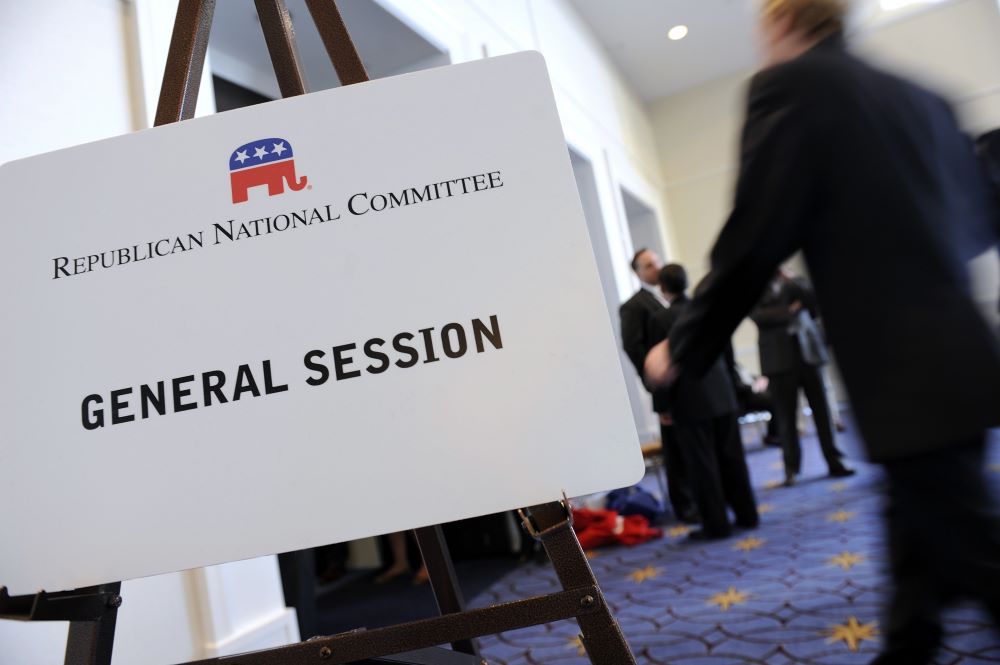
A file photo shows a Republican National Committee sign. The GOP's 2024 platform does not call for a federal ban on abortion, but says that states are free to pass laws restricting abortion. (OSV News/Reuters/Jonathan Ernst)
During the Sept. 10 presidential debate against Harris, Trump took credit for overturning Roe, but the former president framed that achievement primarily as a victory for democracy rather than as a major milestone for the pro-life movement.
"This is an issue that's torn our country apart for 52 years, every legal scholar, every Democrat, every Republican, liberal, conservative, they all wanted this issue to be brought back to the states where the people could vote and that's what happened," Trump said. (Politifact and other fact-checkers have said that even legal scholars who opposed Roe v. Wade would not have supported overturning it on these grounds.)
Asked during the debate if he would sign a national abortion ban — his running mate, U.S. Sen. JD Vance, has said Trump would veto such a measure — Trump declined to answer, instead telling the debate moderators that the issue was a moot point.
"I'm not signing a ban. And there's no reason to sign a ban. Because we've gotten what everybody wanted," Trump said.
Advertisement
The former president's softened stance on abortion did not surprise pro-life activists such as Judie Brown, president and co-founder of American Life League, a Catholic anti-abortion organization.
"I never thought Donald Trump had a sincere bone in his body, so I'm not shocked by this," Brown told NCR. "He's one of the politicians who puts their finger up in the air, gets the wind signal, and then acts accordingly."
If Trump loses in November, said Catholic University's White, his anti-abortion base will likely attribute the defeat to him not being unequivocally pro-life.
"I think there will be a lot of reasons if he loses and a lot of arguments will be based on different things," White said. "But again, Trump knows he's in a box. He knows he needs to cut into those losses with suburban women so he's trying to square the circle. But it's more like a Rubik's Cube."





